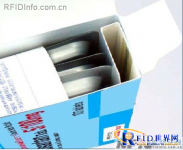
South Korea Hanmi uses RFID solutions to automatically sort medicines
[ad_1]
South Korea’s Hanmi Pharmaceutical Company is the largest drug manufacturer in South Korea. Two years ago, it installed RFID solutions in its two sub-processing plants to track the three processes of drug packaging, sorting, and shipping, and realize the automation of order execution.
The South Korean government regulates the price reduction of certain medicines. Hanmi’s staff can hold RFID readers to make statistics on medicines in warehouses and retail stores to ensure real-time prices.

As shown in the picture, the LSIS linear RFID tag is pasted on the inner wall of the medicine box
Hanmi Pharmaceutical Co., Ltd. established a special information department to study RFID technology in 2005, and carried out pilot work for the first time in 2006. In 2009, with the support of government funds, the company began to fully deploy RFID solutions. With the advocacy of the government, more and more Korean pharmaceutical companies are adopting RFID solutions. It can be seen that the plan to achieve national drug tracking in 2013 is highly possible.
As the intelligent terminal of the automatic sorting system (APS), RFID tags adopt passive ultra-high frequency (UHF) RFID tags and readers that comply with the EPC Gen 2 standard to realize the automation of the collection, packaging, and freight processes. The company uses LS Industrial Systems’ (LSIS) linear tags, in which the chip uses Impinj’s Monza model. The first three digits of the label number are the country code, the next four are the company code, and the rest are the drug code. In addition, a barcode containing the same content is printed on the outside of the package. Hanmi installed a total of 50 RFID readers in the production workshop, covering 35 production lines. In terms of software, it includes three parts: middleware for receiving data, batch conversion software, and data storage software, all of which are developed by the company.
The label is directly pasted on the outside of the outer packaging of the medicine, and it passes through the channel reader with the conveyor belt, and reads the information at a speed of 150-200 labels per minute. Medicines that have not read the label will no longer enter the production line, and are automatically sorted into a plastic bag near the reader. The label is read again. If the reading is successful, it will enter the packaging line through the conveyor belt. If it fails, it will return to the product again. Labeling.

Hanmi intends to use smart shelves to achieve effective inventory management. Currently, the smart shelf project is still in progress. Retailers are already using readers with embedded Impinj chips for inventory management, and the data read is forwarded to Hanmi’s software via Wi-Fi.

The RFID solution greatly improves production efficiency, reduces the error rate of the production line, and helps the company to grasp the inventory situation in real time and avoid the occurrence of out of stock.
[ad_2]



